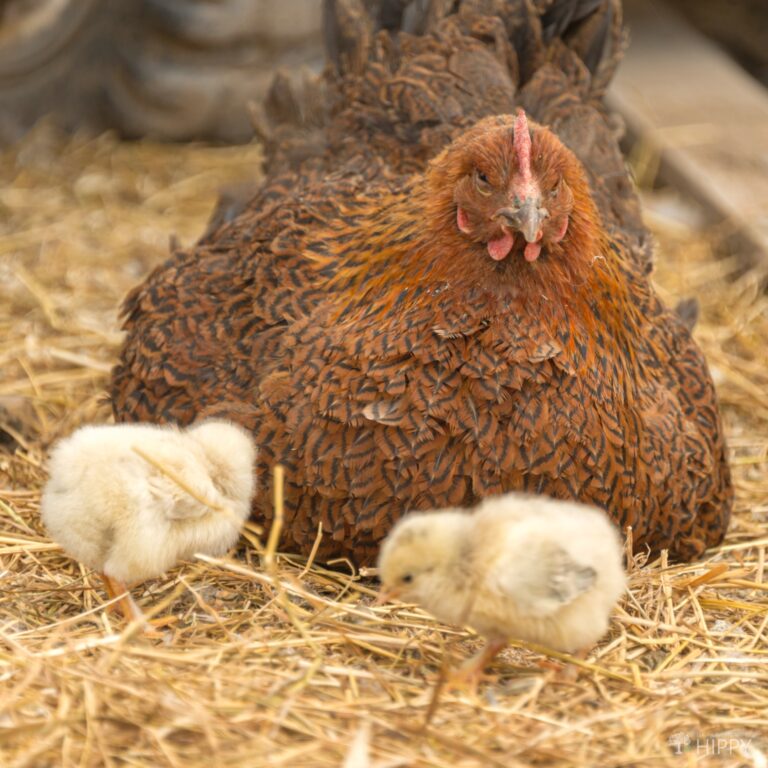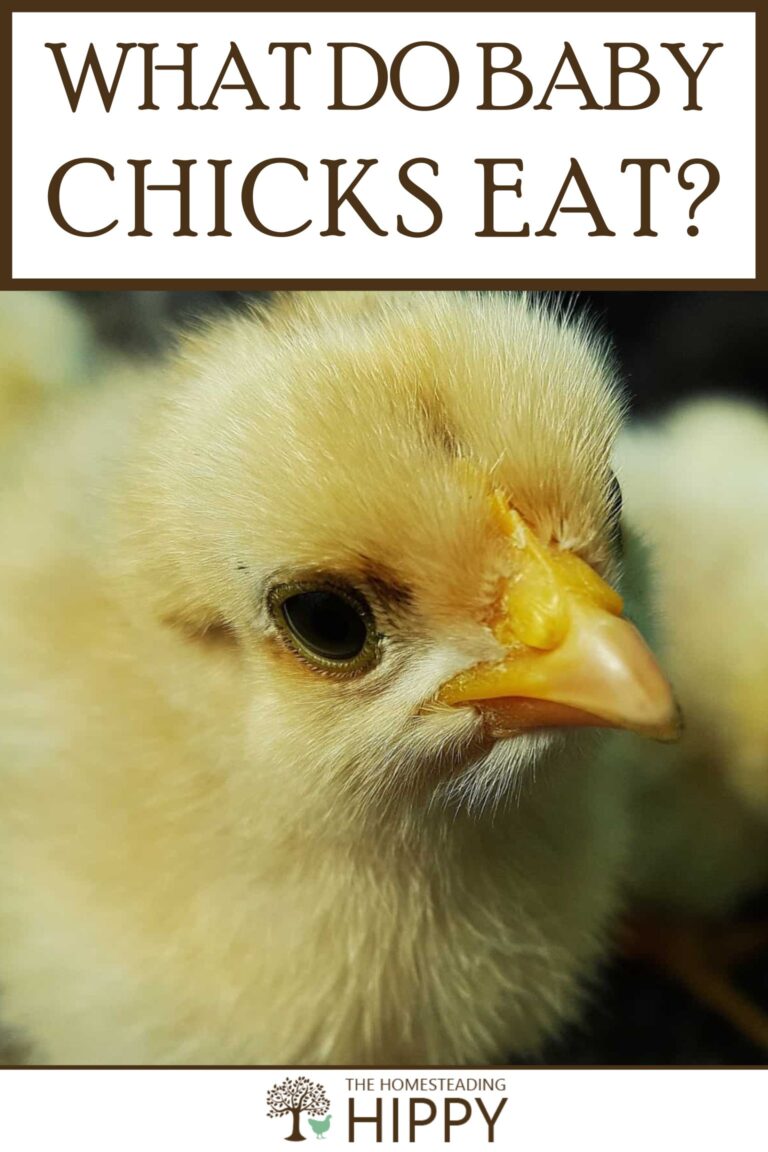You bring your new baby chicks home and they are so cute. But have you thought about what you will feed them? It is important to know what to feed your baby chicks so that they grow up healthy and strong. Let’s take a look at what baby chicks eat and how to properly feed them…

When Baby Chicks Hatch What Do They Eat?
Baby chicks don’t need anything to eat or drink for the first 48 hours after they hatch. This is because they absorb the yolk of the egg into their body before they break through the shell.
However, once they are dry and fluffed up, you will need to introduce food and drink. The best way to do this is to provide a shallow dish of water and a small amount of chick feed.
The water will help the chicks stay hydrated, and the feed will provide them with the nutrients they need to grow. If you have any leftover egg shells, you can also offer these to the chicks as a source of calcium.
What Are the Essential Nutrients for Baby Chicks?
Here are the key nutrients your growing chick needs:
Protein
Protein is essential for proper growth and development in baby chicks. A diet that is too low in protein can lead to stunted growth, feather abnormalities, and a decrease in egg production later in life.
For this reason, it’s important to make sure that baby chicks have access to a high-quality source of protein, such as chick starter feed or crickets.
Calcium
Calcium is another important nutrient for baby chicks. It helps with bone development and prevents health problems like rickets.
A lack of calcium can also cause prolapses in hens (when the uterus or oviduct comes out through the vent). Good sources of calcium include oyster shell grit and eggshells.
Vitamins and Minerals
Baby chicks also need vitamins and minerals like vitamins A, B, and E, as well as niacin, biotin, and potassium. These nutrients are essential for normal growth, development, and immunity.
You can find them in most commercial chick feeds, or you can add them to your chickens’ diet with vitamin supplements.
What Can You Feed a Baby Chick?
Here are a few things you can feed your baby chicks:
Chick Starter Feed
Chicks need a high-protein diet when they are growing. A chick starter feed is a specially designed food for baby chicks that has all of the nutrients that they need to grow.
Chick starter feed usually has a higher percentage of protein than chicken lay pellets or chicken scratch. You can purchase chick starter feed at your local farm store or online.
Grit
Grit is small pieces of rocks and sand that help chickens grind their food in their gizzard. Chickens do not have teeth so they need grit to help them digest their food properly.
Baby chicks need grit as well because they are still growing and their gizzard is not fully developed yet. You can purchase grit at your local farm store or online. You can also offer your chicks some dry, crushed eggshells as grit.
Water
Chicks need plenty of fresh, clean water to drink. Their water should be changed daily and kept in a clean water that is safe for them to use. Water is essential for chicks because it helps them stay hydrated and aids in digestion.
What Do You Feed a Sick Baby Chick?
When a baby chick becomes sick, it can be difficult to know what to do. However, there are some basic steps that you can take to help the chick recover.
First, make sure that the chick has access to fresh water at all times. Chicks can become dehydrated quickly, so it is important to keep their water dish clean and full.
Second, provide the chick with a high-quality food source. Chick crumbles or pellets are a good option, as they are packed with nutrients that will help the chick to recover.
In many cases, getting your chick some extra probiotics or electrolytes is a good idea, too. You can supply these with a storebought supplement, like Sav-A-Chick, if you have it, or simply some plain yogurt mixed with crumble feed.
Can (or Should) You Force Feed Them?
There is no easy answer to this question. On the one hand, it is important to make sure that sick chicks get the nutrients they need in order to recover. Otherwise, they may succumb to their illness.
On the other hand, force-feeding can be stressful for both the chick and the caregiver, and it may not be successful in saving the chick’s life.
If you are thinking about force-feeding a chick (usually done with a dropper or syringe), be sure to check with your veterinarian first.
They’ll be able to give you the best advice on how to do so, as well as provide you with the right tools and techniques so you don’t harm your chick.
5 Herbs to Feed Baby Chicks
Herbs are a great way to give your baby chicks a nutritional boost. Here are our top 5 picks for the best herbs to feed your baby chicks:
- Basil – Not only does basil contain vitamins A and C, but it also has antibacterial and antiviral properties that can help keep your chick’s immune system strong.
- Oregano – Oregano is a good source of vitamins A, C, and K, as well as iron and calcium. It also has antimicrobial properties that can help protect your chicks from bacteria and parasites.
- Thyme – Like basil and oregano, thyme is also high in vitamins A and C and has antimicrobial properties. It’s also a good source of manganese, which is essential for bone growth.
- Rosemary – Rosemary is rich in antioxidants and has anti-inflammatory properties that can help keep your chicks healthy. It’s also a good source of iron and calcium.
- Chamomile – Chamomile is known for its calming effect on humans, but did you know it can also be beneficial for chickens? Chamomile can help alleviate stress in chickens, which can lead to better overall health.
When Can Baby Chickens Eat Normal Food?
A chick’s diet is different from an adult hen’s diet, and it’s important to make sure you are transitioning your chicken correctly to ensure a long and healthy life.
A chicken’s diet changes as it matures because its body changes. A chick is growing and developing at a rapid pace, so it needs a lot of energy and nutrients to support that growth
An adult hen, on the other hand, has reached maturity and is no longer growing. As a result, she doesn’t need as many calories or as much protein as a chick does.
For the first 6 weeks of life, your chick should be eating a starter feed that is high in protein and has all the essential nutrients she needs for healthy growth and development.
After 6 weeks, you can start transitioning her to a grower feed. A grower feed has slightly less protein than a starter feed but still has all the essential nutrients your chicken needs.
Once your hen reaches 18 weeks old, she can start eating adult feed. An adult feed is lower in protein than both starter and grower feeds but contains all the vitamins and minerals an adult chicken needs for good health.
You can also supplement your hen’s diet with things like scratch grains, grit, oyster shell, and green vegetables for added nutrition.
Optional Snacks and Treats to Feed Your Chicks
As your chicks get older (around 6 weeks or so), you can start offering them chopped-up vegetables like lettuce, kale, or spinach in addition to their regular feed and grit.
Just make sure the pieces are small enough for them to eat easily and introduce new foods gradually so their tummies have time to adjust. Baby chicks love treats, so feel free to experiment a bit and see what your flock enjoys the most!
Here are a few options:
1. Worms
Loaded with protein, calcium, and other essential nutrients, worms make a perfect snack for growing baby chicks.
You can either purchase worms from your local pet store or dig some up from your backyard. Just be sure to wash them off before feeding them to your chicks!
2. Crickets
Another excellent source of protein, crickets are a crunchy and nutritious treat for baby chicks. You can usually find crickets at your local pet store, but you can also order them online.
3. Tomatoes
Sweet and juicy, tomatoes are a favorite snack of baby chicks everywhere. Be sure to cut the tomatoes into small pieces so that your chicks can easily eat them.
4. Oatmeal
Oatmeal is not just for breakfast! It’s also a great snack for baby chicks. Just cook the oatmeal according to package directions and then let it cool before giving it to your chicks. They’ll love pecking at the warm, gooey oats.
5. Strawberries
Is there anything more refreshing than a ripe strawberry? Your chicks will think so!
Strawberries are packed with vitamin C and make a perfect summertime snack for baby chicks. Just be sure to remove the stem and leaves before giving them to your feathered friends.
6. Apples
Another sweet and juicy fruit, apples make a delicious snack for baby chicks. Just like with tomatoes, be sure to cut the apples into small pieces so that your chicks can easily eat them. You can also offer apple slices as an occasional treat for older chickens.
7. Lettuce
While it might not seem like it, lettuce is actually a great source of nutrition for baby chicks.
Rich in vitamins and minerals, lettuce is perfect for helping your little ones grow up healthy and strong. Be sure to buy organic lettuce if possible and wash it thoroughly before feeding it to your chicks.
8. Watermelons
Watermelon is the perfect summertime snack! Not only is it refreshing and delicious, but it’s also packed with nutrients like vitamins A and C.
Just remove the seeds before giving watermelon slices to your baby chicks — they’ll love pecking at this juicy fruit!
9. Grass
Believe it or not, grass is actually a nutritious snack for baby chicks (and full-grown chickens too!).
Grass is rich in fiber and helps keep chickens’ digestive systems healthy — so feel free to let your little ones munch on some grass whenever they’re hungry!
How Much Should You Feed Your Baby Chicks?
Baby chicks need a lot of energy and protein to grow. So, how much should you feed them?
In general, you should feed your baby chicks 1/4 cup of starter feed per bird per day, split into two meals so they have food available to them at all times.
If you’re not sure how much to give them, it’s always better to err on the side of too little rather than too much. Baby chicks can easily gorge themselves and become sick if they eat too much.
As your chicks grow, you’ll need to increase the amount of food you give them. By six weeks of age, they should be eating about 1/2 cup of feed per bird per day.
By eight weeks of age, they should be up to 1 cup of feed per bird per day. Once they reach adulthood, chickens typically eat between 2-4 cups of feed per day, depending on the variety of chicken and the amount of exercise they get.
Of course, these are just guidelines. Every chicken is different, so it’s important to keep an eye on your own flock to see how much they’re eating and adjust the amount of food accordingly.
What NOT to Feed a Baby Chick
Before you bring home your new feathered friend, there are a few things you need to know about what NOT to feed them.
Chicks should not eat processed foods, like chips or crackers. They also should not eat spicy foods or anything with salt, sugar, or fat. Baby chicks need a diet that is high in protein and low in fat.
The best way to achieve this is to feed them a diet of pellets, grits, and grain. You can also supplement their diet with chopped greens and insects.
Another thing to avoid is feeding your chicks table scraps. Chickens are omnivores, which means they will eat just about anything.
However, that does not mean that you should give them whatever you are eating. Table scraps are often high in fat and salt, which can lead to health problems for your chicks. Stick to their pellet, grit, and grain diet and they will be healthy and happy!
That said, it is okay to feed some scraps that would otherwise go into the compost bin, as long as they are not processed or filled with preservatives.
Some things to avoid include:
- Onions
- Chocolate
- Avocados
- Eggplant
- Raw Peanuts
- Moldy Bread
- Rhubarb
- Pickles
- Potato Chips
- Candy
While some of these might sound obvious, some contain harmful ingredients (like solanine, in the case of eggplant) that can make your chickens very sick.
What Else Do Baby Chicks Need to Survive?
First and foremost, your baby chicks are going to need a good brooder. A brooder is basically just a chicken coop for baby chicks.
It should be big enough for them to move around comfortably, but not so big that they get lost or chilled (a common problem in larger brooders).
The brooder should also have a heat lamp to keep the chicks warm, as well as some bedding material (like straw or wood shavings) for them to nest in.
As your chicks grow, they’re going to need more space to roam. At around 6 weeks old, they can be moved into an outdoor chicken coop (assuming the weather is warm enough).
Just like with the brooder, make sure the coop is big enough for them to move around comfortably but not so big that they get lost or chilled. And of course, don’t forget to provide plenty of food and water!
Last but not least, your chicks are going to need plenty of love and attention! Just like any other pet, chickens thrive when they feel loved and secure.
Spend time every day playing with your chicks, petting them, and talking to them—they’ll love you for it!
Now that you know what to feed your baby chicks, you can get started on raising healthy and strong chickens! Baby chicks need a high-protein diet, grit, and plenty of water to stay hydrated.
You can purchase all of these things at your local farm store or online. Feeding your baby chicks a proper diet is essential for their growth and development.


Rebekah is a full-time homesteader. On her 22 acres, she raises chickens, sheep, and bees, not to mention she grows a wide variety of veggies. She has a huge greenhouse and does lots of DIY projects with her husband in her ever-growing homesteading endeavor. Learn more about Rebekah here.
